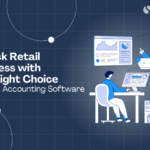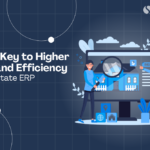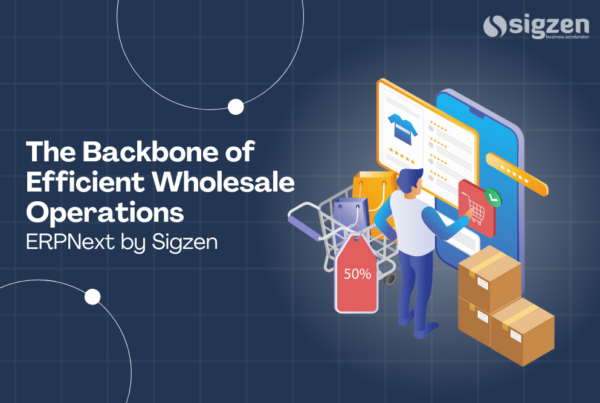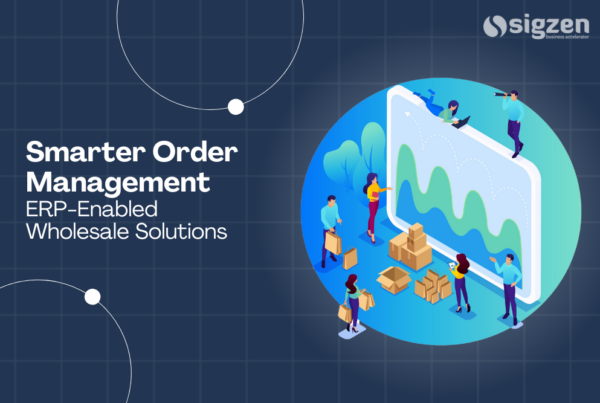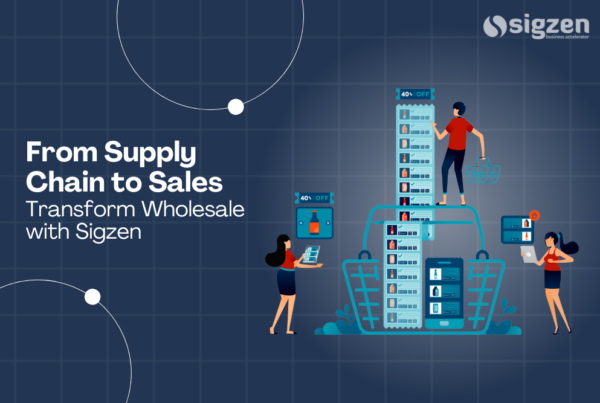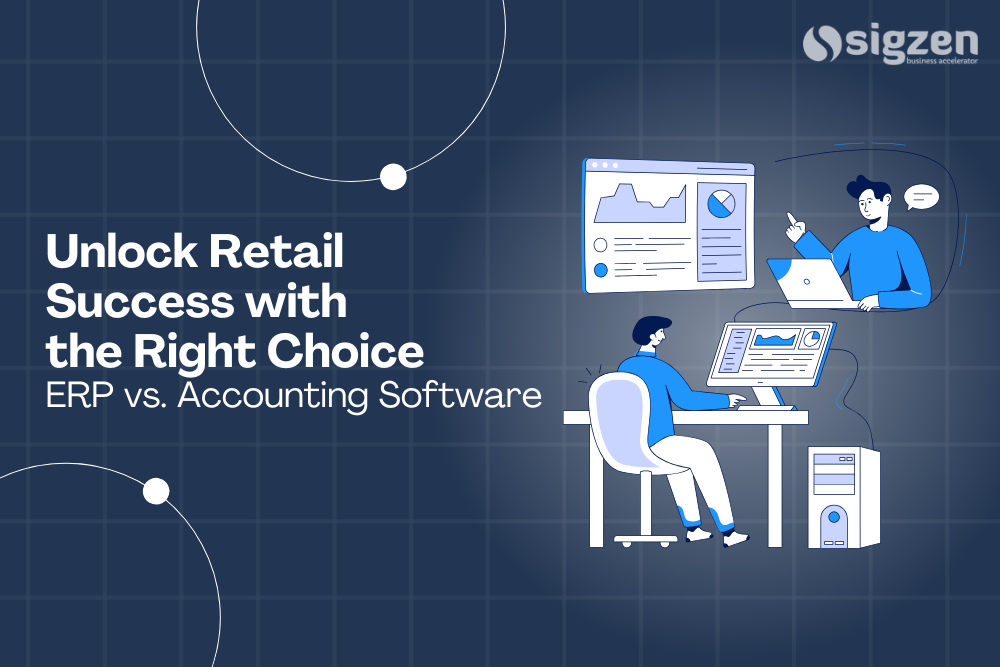
Managing finances effectively is the backbone of any retail business. Retailers face complex challenges such as fluctuating inventory, seasonal demand, multi-location operations, and the need for real-time insights. This has left many retailers wondering: Is traditional accounting software enough, or is a retail ERP system the better choice?
In this article, we’ll compare ERP for Retail and traditional accounting software, focusing on their roles in financial management, and explore why ERP solutions like those from Sigzen might be the future of retail.
What Is Traditional Accounting Software?
Traditional accounting software is designed to handle fundamental financial processes such as bookkeeping, invoicing, payroll, and tax management. Popular examples include QuickBooks and Tally. While these tools are effective for basic financial tasks, they often lack the advanced capabilities needed to manage the multifaceted operations of a retail business.
What Is Retail ERP?
ERP for Retail (Enterprise Resource Planning) is an integrated solution that combines financial management with other business operations such as inventory, sales, customer management, and supply chain. A system like ERPNext, offered by Sigzen, provides a single platform to automate and unify retail operations.
Comparing Retail ERP and Traditional Accounting Software
1. Scope of Functionality
- Traditional Accounting Software: Focused solely on financial processes. Ideal for small businesses with straightforward needs.
- Retail ERP: Combines financial management with other core operations like inventory, sales, and supply chain. Perfect for retailers managing multiple stores, large inventories, or omnichannel strategies.
2. Real-Time Insights
- Traditional Accounting Software: Provides static reports that require manual updates and analysis.
- Retail ERP: Offers real-time insights across all business functions, empowering data-driven decisions. For example, the ERPNext Accounting Module integrates seamlessly with inventory and sales for up-to-the-minute financial data.
3. Inventory Management
- Traditional Accounting Software: Requires manual input or integration with third-party tools for inventory tracking.
- Retail ERP: Tracks inventory automatically, updating stock levels after every sale and purchase. Modules like ERPNext’s Inventory and Stock Management ensure optimal inventory control.
4. Scalability
- Traditional Accounting Software: Limited scalability; as your retail business grows, these systems may struggle to handle increased complexity.
- Retail ERP: Designed to grow with your business, handling multi-location stores, warehouses, and e-commerce platforms effortlessly.
5. Compliance and Reporting
- Traditional Accounting Software: Generates basic financial reports but may require additional work for tax compliance or audit preparation.
- Retail ERP: Automates compliance and provides audit-ready financial reports, ensuring you’re always prepared for regulatory checks.
Key Benefits of ERP for Retail Financial Management
- Streamlined Operations ERP integrates financial data with sales, inventory, and supply chain operations, reducing manual tasks and errors.
- Cost Control By providing a unified platform, ERP reduces the need for multiple software subscriptions and manual reconciliation, saving both time and money.
- Real-Time Monitoring Retail ERP systems offer dashboards and analytics that help retailers track cash flow, sales performance, and inventory costs in real time.
- Improved Decision-Making With centralized data and advanced analytics, retailers can identify trends, forecast demand, and make informed financial decisions.
- Regulatory Compliance ERP systems simplify compliance with tax regulations and industry standards by automating calculations and documentation.
Why Retailers Are Moving Away from Traditional Accounting Software
As retail operations become more complex, the limitations of traditional accounting software are becoming apparent. Retailers need systems that offer more than just basic bookkeeping; they need tools that can adapt to the dynamic nature of the industry.
Consider these scenarios:
- A retailer with multiple outlets struggles to consolidate financial reports from different locations using traditional software.
- Seasonal spikes in demand lead to inventory shortages, causing missed sales opportunities.
- A growing e-commerce arm requires real-time integration with brick-and-mortar stores, which traditional accounting tools can’t handle.
Retail ERP addresses these challenges by providing a unified platform for managing all aspects of a retail business.
ERP for Retail: A Real-World Example
Let’s look at how ERPNext, implemented by Sigzen, helps retailers revolutionize their operations.
Case Study: A Multi-Store Retail Chain
Challenge: Managing inventory, finances, and sales across five locations using traditional accounting software. The retailer faced issues with stockouts, delayed financial reports, and manual reconciliation.
Solution: The retailer adopted ERPNext, which integrated their financial data with inventory and sales processes. Features like POS Integration enabled real-time tracking of sales, while automated inventory updates ensured optimal stock levels.
Results:
- 30% reduction in operational costs.
- Real-time financial reporting.
- Improved customer satisfaction due to better stock availability.
Choosing the Right ERP for Retail
When selecting an ERP solution, consider the following:
- Customization: Can the system adapt to your specific business needs?
- Ease of Use: Is the interface user-friendly for your team?
- Integration: Does it integrate with your existing tools and platforms?
- Vendor Support: Is ongoing support and training provided?
Sigzen’s ERP Solutions tick all these boxes, offering tailored ERPNext implementations for retailers of all sizes.
Conclusion: The Future of Financial Management in Retail
For retailers looking to stay competitive, traditional accounting software is no longer sufficient. ERP for Retail offers a comprehensive solution that integrates financial management with all aspects of retail operations. From real-time insights to scalability, ERP systems are the key to efficient and effective financial management.
If you’re ready to elevate your retail business, explore Sigzen’s ERP solutions and discover how ERPNext can transform your operations.

